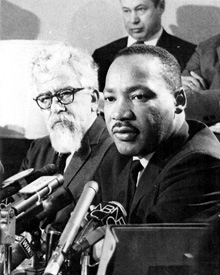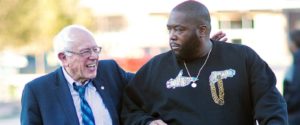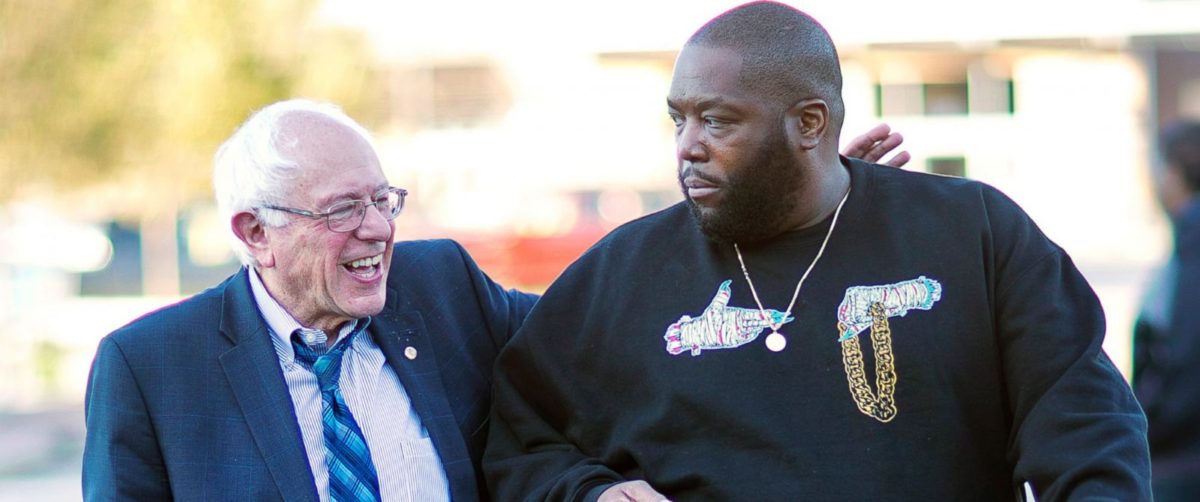I have a pretty extravagant lunch routine…
…I will typically grab a yogurt and spend a little “me time” on the web catching up on the late-night TV antics that I am no longer old enough to stay up to watch.
Pretty crazy, I know.
Very rarely do I see anything that inspires any kind of reaction; never have I watched something that inspired me to write professionally. And I can assure you that I was not anticipating an interview with Killer Mike could be such a catalyst.
And yet…
I thought there were two remarkable takeaways from this worth sharing…
The first was Killer Mike’s claim that Bernie Sanders is the spiritual heir to Martin Luther King, Jr.’s message of social justice.
You can leave your aesthetic sensibilities of Killer Mike’s work as an artist and your political views of Bernie Sander’s work as a public servant in someone else’s comments. I am not here to advocate for either. What struck me is essentially this:


Again, please. I am not suggesting that Bernie Sanders is Rabbi Abraham Joshua Heschel any more than I would be suggesting that Killer Mike is Martin Luther King, Jr.
But I would be lying if I didn’t say that my very first thought when listening to this younger, African-American, hip-hop artist and social justice advocate talk about this older, Jewish, public servant and social justice advocate wasn’t a reminder of how inextricably linked the Jewish and African-American communities were during the civil rights era and whether this unlikely duo represents an anomaly or a harbinger.
I have written and others have written better about that historical and current relationship. As we head into yet another MLK Day, perhaps we can be reminded once again of our “shared dreams” and inspired to bring them a day closer to realization.
~~~~~~~~~~~~~~~~~~~~~~~~~~~~~~~~~~~~~~~~~~~~~~~~~~~~~~~~~~~~~~
The second takeaway – and the one that has more applicability to Jewish day school – is Killer Mike’s proscription for how to best support underserved communities. He lays out a vision of empathy which can only be achieved through relationship. This requires us to leave our comfort zones and engage with the wider world. In Killer Mike’s context he is talking essentially about white, middle-class folk, but in it I heard echoes of a common concern families have about the ghettoization of Jewish day schools, their lack of racial diversity and the impact it has on children who will need to live, work and contribute to a multicultural world.
Almost a year ago, I wrote about Ferguson, Michael Brown, and Eric Garner, and my struggle to decide if I had what to say.
Saying nothing at all doesn’t feel right either. To say nothing would suggest that I have no stake in this issue, that it neither impacts me nor is incumbent upon me to participate in. Even, if I am unclear as to what “participation” ought to be. As a citizen and as an educator, I do have a stake, I am impacted and I believe it is incumbent upon me to participate. And I will, like many others, have to struggle to figure out what participation looks like because I am unwilling to remain forever a bystander. Are we our brother’s keeper? What does that keeping look like today?
And that was long before Cleveland, Charleston, and Chicago and the rest…
Killer Mike provides one path of participation. Many of our schools have relationships with underserved schools where tutoring, mentoring, supplies, books, etc., are shared. Many of our schools have social justice programs where they take what they are learning in the walls of their buildings and go out into the world to make a difference. These are wonderful initiatives to be sure. However, if economic inequality is the issue of today (even if we cannot agree on what to do about it), we can and should do more. Furthermore, if we want our schools and our children to really matter to black (and brown and impoverished) lives in our communities, we will need to do more than engage in hashtag activism. We need to engage with people.
~~~~~~~~~~~~~~~~~~~~~~~~~~~~~~~~~~~~~~~~~~~~~~~~~~~~~~~~~~~~~~
Add one.
As we prepare to commemorate the life and work of Dr. Martin Luther King, Jr., let’s get curious about what our networks, organizations and schools are doing to really engage with others. I challenge schools – and other thought-leaders – to share links to programs or ideas in the comment section or on social media. I welcome your feedback, ideas, curiosity and contributions.


Your intellect, wit, and humanity never cease to amaze me! I am so proud of who and what you have become. I am so proud we share blood. I am so proud to be your aunt.